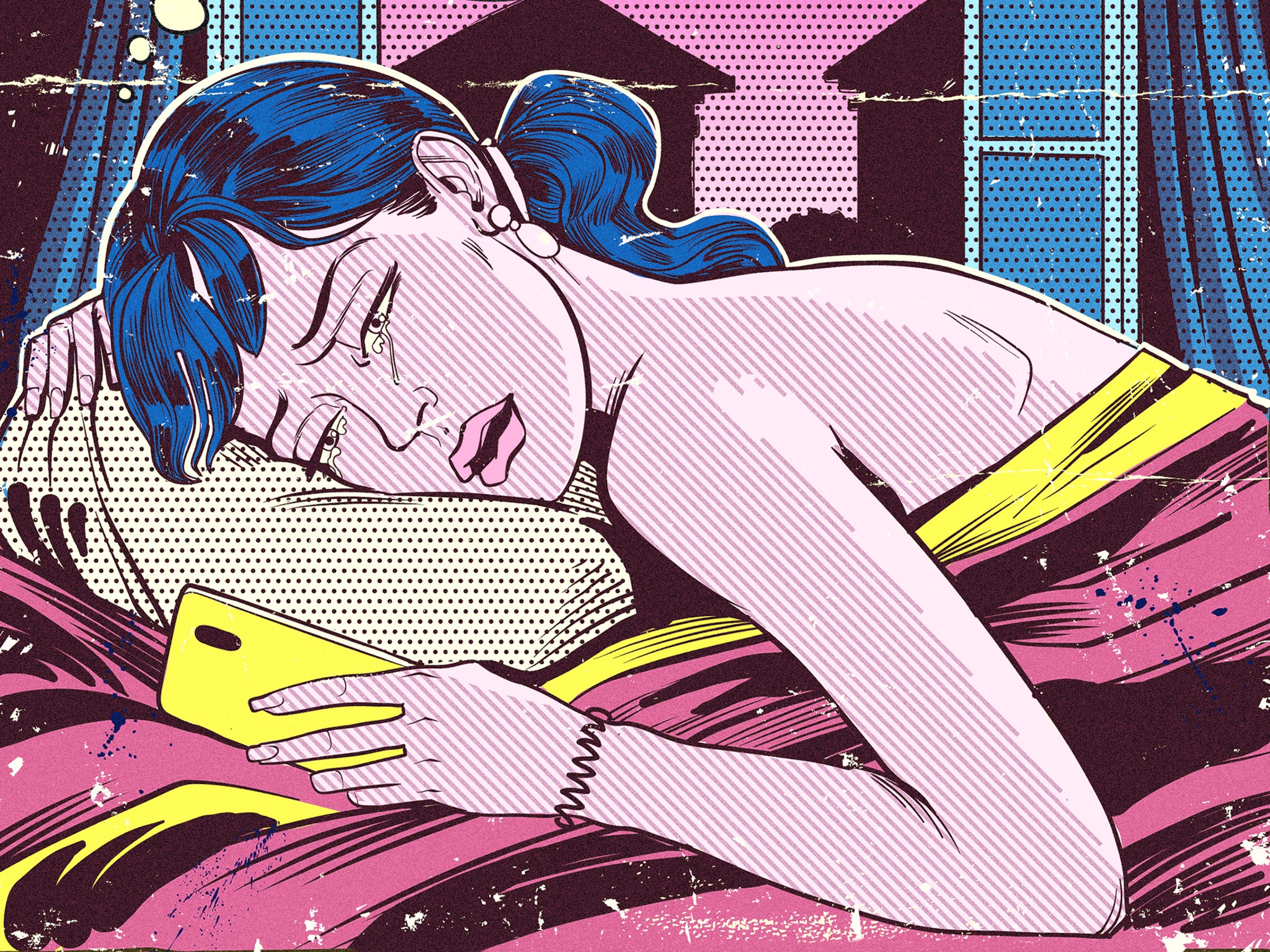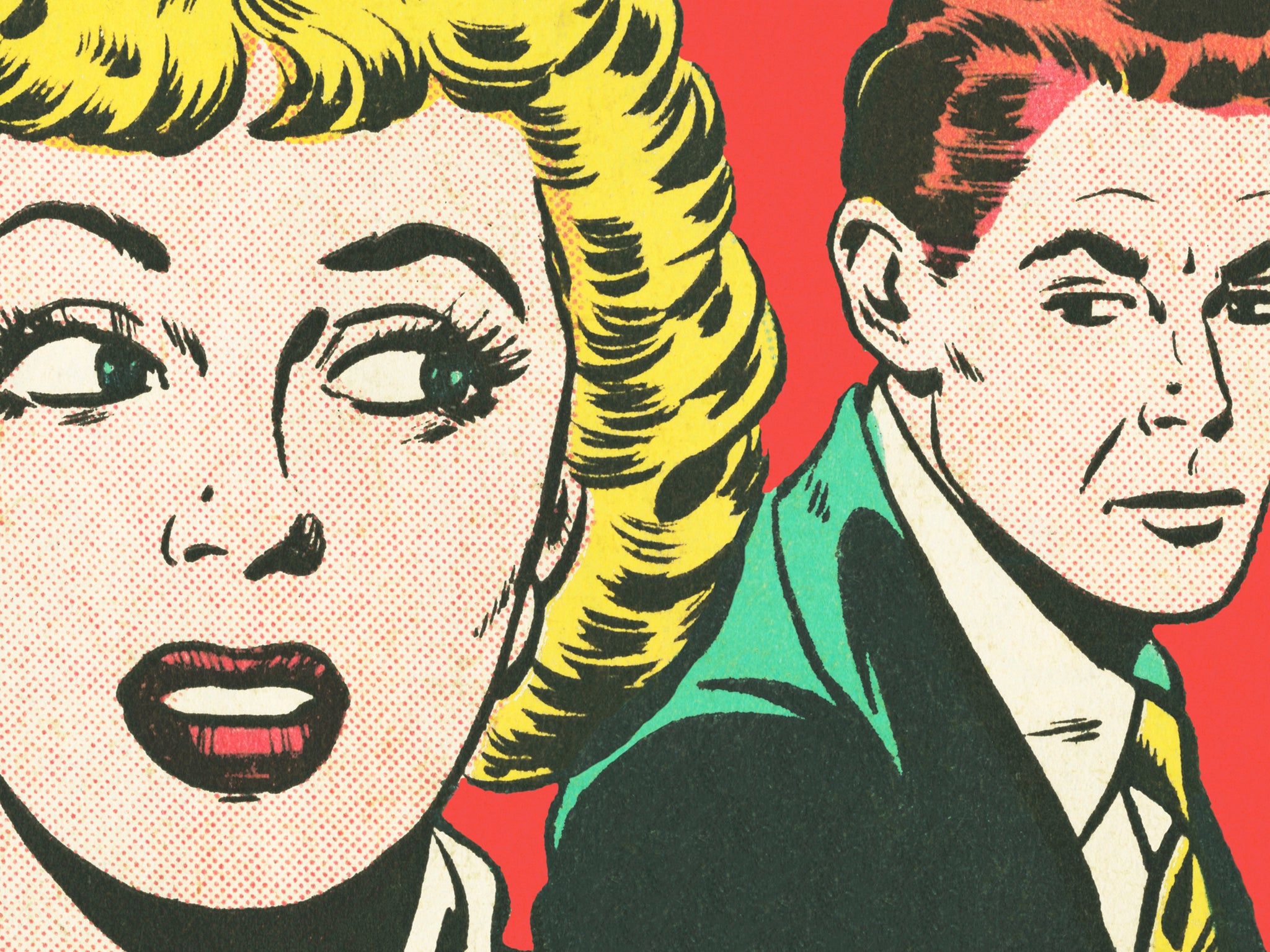Sad, paranoid and still single: How the dating app destroyed us all
The likes of Hinge and Bumble have turned dating into a cesspit of ghostings, blind panic and rampant dehumanisation, and many have had enough. Eloise Hendy talks to experts and app veterans about our current romantic crisis


Your support helps us to tell the story
This election is still a dead heat, according to most polls. In a fight with such wafer-thin margins, we need reporters on the ground talking to the people Trump and Harris are courting. Your support allows us to keep sending journalists to the story.
The Independent is trusted by 27 million Americans from across the entire political spectrum every month. Unlike many other quality news outlets, we choose not to lock you out of our reporting and analysis with paywalls. But quality journalism must still be paid for.
Help us keep bring these critical stories to light. Your support makes all the difference.
Jenny’s plan was to go to Chinatown and get some chicken. It was a first date – she’d met a guy on Hinge and arranged to meet at Leicester Square at 6.15pm. After messaging that she was setting off, she hopped on the Northern line. Emerging on the other side, back into phone signal range, she suddenly sees two messages from her date pop up. “Are you pranking me Jenny,” one asked. Then, she realised his WhatsApp photo had disappeared. He’d blocked her. It was 6.17pm – she was two minutes late.
In a TikTok, Jenny revealed that she and her date did eventually meet up – he claimed his WhatsApp had been “glitchy” – but her story took off all the same, serving as apparent proof that dating is currently in the pits. Just days after Jenny posted her TikTok, another video went viral. In it, a woman in New York claimed she walked out on a date after he declined to pay a $3 cheese charge for his burger. The internet swiftly jumped to her date’s defence, but many people also suggested that the woman’s behaviour was indicative of a rotten dating culture. Blocking people at a moment’s notice. Turning encounters into content. Fear of intimacy and fear of rejection battling it out. So, what’s going on?
Annie Lord, a Vogue columnist and the author of Notes on Heartbreak, blames dating apps. “They give you so many options,” she says, but suggests this illusion of infinite choice actually works to erode accountability and dehumanise potential matches. “They have no connection to your social circle, so disappearing is easier.” As a collection of images and prompts on a screen, people seem insubstantial – ghosts in the machine.
Since apps transformed dating into something that could be managed at the swipe of a thumb, much has been written about the ways they’ve revolutionised relationships and hook-up culture. Most discussions spin around the same arguments: apps reduce attraction to a formula; they rely on superficial, snap judgements; they make dating transactional. And, as Lord highlighted, endless streams of “options” seem to make accountability a thing of the past. One element of app culture that can sometimes get overlooked, however, is the fact that apps are profit-driven businesses. No matter what their marketing copy might proclaim, they are designed to never be deleted. Companies like Bumble and Match Group don’t want you shacking up – they need you to keep coming back to swipe, “super like” and, in desperation, upgrade to premium.
Studies have shown dating apps to be pathologically addictive. Only two years after its launch, Tinder reported that the average user was logging in 11 times a day. Cultural anthropologist Natasha Dow Schüll, who specialises in gambling addiction, has likened the design of dating apps to that of slot machines. What the infinite swipe design does is get you hooked on random rewards – not positive interactions, but the dopamine hit of getting a match. Indeed, according to a 2016 study, fewer than 10 per cent of matches are followed through with any contact at all. Instead, users choose to keep “playing the game”.
Lord thinks this is a crucial part of why dating feels bad at the moment. “Before, when people would want affirmation and intimacy from anyone, they used to go out and get with people to do that,” she says. “Now apps fill that space. So if you feel needy, you’ll just message someone.” This cycle means it can feel like dating apps are “almost just for pen pals now,” she continues, which is “really annoying if you actually want a shag.”
Emotions become bargaining chips, with the ‘winner’ being the party with the least to lose, the least invested and the least emotionally attached
Zoë*, who lives in London, has recently deleted her apps and, as she puts it, “given up on dating”. She believes apps have led to everyone “just waiting for the next best swipe and not [being open] to embrace the person that’s in front of them at the time”. She admits to being guilty of this herself. “There are so many things on profiles that I find totally icky,” she says, “but it got to a point where I was rolling my eyes at every profile and I thought, ‘I’m not being a very nice person on here because of this’.” Edinburgh-based Sarah Kenchington has also decided to come off the apps. “If I had to swipe past one more man holding a gigantic fish, I was going to lose my will to live,” she declares. “Every time I open Hinge I am reminded of why I never open Hinge.” But, more than men flaunting fish, Kenchington got sick of apps because they “turned dating into a job”. Essentially, it seems apps might have gamified dating, but the game isn’t much fun.
Alice Revel – who, at 38, describes herself as “a geriatric millennial” – has done her time on apps. “I’ve used OK Cupid, Tinder, Bumble and they’re all as bad as each other,” she says. In her view, the main problem with dating at the moment is simply exhaustion. “There’s so much digital stuff in our lives that this is just another thing to do … to make time for,” she says. Yet Revel also flips it back on the companies that now control so many people’s love lives. “There’s very little scrutiny of these apps as businesses,” she says. “We have this weird habit of forgetting that these apps are corporate structures, not friendly services designed to improve our lives.” She thinks people should be more conscious of how apps use personal data to make money. “They aren’t our friends,” she adds, “they’re businesses.”
While Big Tech companies pose as helping hands in the pursuit of love and happiness, many of their users find themselves resembling machines. Charlie Rosse says she didn’t feel like a human being while on apps, “in the way I was being messaged [and] the way I was judging others”. Dating requires you to be vulnerable, she says, but she believes it’s a lot easier to treat someone badly when they’re “a faceless person behind a screen”. She found this created a negative feedback loop on and offline that led to her closing down emotionally. “I became really disheartened by the amount of casual cruelty and misogyny I was encountering,” Rosse explains, “which was then affecting how I was talking to men in real life, who could possibly have been more suitable partners had I not felt the need to protect myself with barriers.” But is it not only fear of cruelty that is causing people to keep others at arm’s length, but fear of emotion itself?
Lord thinks some of the current discourse around dating stems from a protective mechanism of sorts. “We get so used to rejection that I think it’s easier to blame it on toxic behaviours,” she says. “The fact that so many people just wouldn’t be into you is too painful to get your head around.” Buzzwords can then become their own kind of barriers. “You’re like, ‘oh, he led me on, he lovebombed me, I was gas lit’, because it sucks that you can meet someone and have a really amazing date and then they’re just like, ‘no, you are not quite the one for me,’ or they ghost you. It just feels s***. [So] we pathologise it.”
This idea that people are becoming increasingly fearful of painful emotions, and of vulnerability more broadly, has been picked up a few times lately. In a January Substack post, writer and journalist Rachel Connolly described how “cagey and furtive” the young people she interviewed for a piece on ghosting were. “They all seemed sort of terrified of other people, but also of feelings,” she wrote. Sociologist Alicia Denby recently reached similar conclusions in her research into modern dating practices. Drawing on in-depth interviews with UK-based dating app users aged 18–25, she found young people “were reluctant to show emotional vulnerability, which they deemed to be a weakness, in case they were rejected or humiliated”. Denby used the term “emotional stalemate” to describe this metaphorical stand-off, with each party waiting for the other to open up and confess their feelings. “Emotions become bargaining chips, with the ‘winner’ being the party with the least to lose, the least invested and the least emotionally attached.” The irony in this logic, of course, is that if intimacy is the prize, then neither party will win “as neither is willing to put themselves on the line”, Denby wrote.

This also isn’t confined to dating, it seems. Denby’s research into dating’s “emotional stalemate” draws heavily on the work of sociologist Eva Illouz, who argued that the culture of capitalism has led to close, intimate relationships becoming increasingly defined by economic models of bargaining and exchange – imagined as things to be evaluated, measured, and quantified. In the case of dating and dating apps it seems obvious this is the case, but in the realm of platonic relationships, too, there is a growing trend to consider friendships like transactions. Relationships become like work; every emotional interaction is conceived as labour.
“People think they communicate better because they use these words, but they can actually be quite jarring,” Lord says. Therapy-speak of this kind can “obscure what the person’s actually trying to say” she argues, “so it’s easier to snake out of being responsible”. Lord echoes Illouz by suggesting that problems with relationships – both romantic and platonic – are linked to increased individualism. “To succeed in our society, people think about themselves more because they’re encouraged to,” she says. “People now often think, ‘we have so little time, we’re really overworked, we don’t have much money’.” However much this mindset might be based in reality, though, Lord believes it can prevent us forming and cultivating relationships with other people.
“Often we feel like we don’t have the time to deal with people’s emotions and be supportive to the people around us,” she suggests. Yet this feeds into a culture that encourages people to avoid strong attachments. Or to value control and emotional distance over the commitments, sacrifices and vulnerabilities that are necessary to develop intimate connections. It’s this that leads to emotional stalemates. It might not be a quick fix for the dating landscape, but it would help to stop conceiving of other people as draining our finite, emotional resources. Instead, as Lord puts it, we should think that “if you have time for them, then they’ll have time for you – and it’ll be a mutually beneficial, lovely thing”.
*Names have been changed



Join our commenting forum
Join thought-provoking conversations, follow other Independent readers and see their replies
Comments